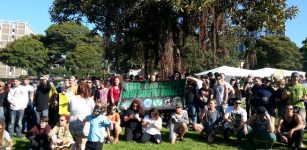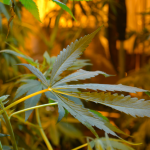Legalise Cannabis: An Exclusive Interview with 420 organiser Chris Hindi

Last Sunday, the Free Cannabis community 420 picnic was held in Sydney’s Victoria Park. The event saw about 170 marijuana enthusiasts turn up, light up and get high.
It’s the fourth picnic Free Cannabis NSW has organised this year, aiming to promote recreational use of the plant – with organisers arguing that all cannabis use is actually medicinal.
Compared to earlier meets, the police presence was quite small. There were only about five officers present on the day and there wasn’t one sniffer dog in sight.
The Sydney picnics are inspired by 420 events that have been taking place around the world for decades.
The origins of 420
In the early 1970s, a group of teens from Marin County, California known as the Waldos coined the phrase ‘420’.
The group used to meet up by a local statue at 4:20 pm, smoke joints and then search for a fabled lost marijuana crop in Point Reyes.
They never found the plants, but they adopted the code 420 to refer to their use of cannabis.
Phil Lesh, bass player for the Grateful Dead, happened to be the older brother of one of the Waldos and he adopted the term, popularising it as he toured the world.
In 1991, followers of the Dead organised a pot smoking meet at 4:20 pm on April 20 at the Bolinas Ridge in Marin County and from there the tradition caught on.
Around the world
Today, 420 events take place throughout the world Groups of smokers meet to light up joints in Amsterdam, London and Vancouver, as well as in Denver Colorado, which was one of the first US states to legalise recreational weed on November 6, 2012.
Of course, 420 smoke-outs are not restricted to one specific time of the day, or year. Sydney events have been held in January, March and June this year.
The next one is scheduled to take place at 1pm on December 4, once again at Victoria Park, Camperdown.
The man behind the Sydney event
Cannabis activist Chris Hindi is the organiser of the Sydney 420 meets.
The founder of the Free Cannabis NSW collective, Hindi’s passionate about ending the persecution of people who use cannabis.
Along with the picnics, he’s organised rallies and symposiums, which are all about raising community awareness about the need to change drug laws.
Chris is also a member of the Drug Law Reform party of Australia. The group is seeking to change the “current harm maximising drug laws.” While they recognise drug use can be problematic, they see it as a health issue and not a criminal one.
Hindi ran as a lower house candidate for the party in the seat of Grayndler in the July federal election this year.
Sydney Criminal Lawyers® caught up with Chris to ask about the logistics of setting up a 420 event and his ongoing campaign to change the public perception of marijuana use.
Last Sunday, you put on another 420 event at Victoria Park. How did it all go?
It went splendidly. I would label it a huge success compared to previous meets that we’ve organised. The last two have been great.
But if I’m being 100 percent honest, the last one we just had was not as good in police presence and police response as the previous one.
At the one we just had we did have two or three people pulled up and given cannabis cautions. No one was charged, but we did have two or three people harassed and given cautions.
Whereas at the last event we had no one harassed. No cautions were given out. Everyone was left in peace.
What would you say the main aim of a 420 event is?
Look, what we’re trying to do is bring out these closet smokers.
What we’ve figured out over the last couple of years is the medicinal cannabis campaign has become a lot louder and been getting a lot more public attention in the eyes of the media.
Whereas, the recreational side or not even necessarily recreational – because we don’t like that word. We believe all use is medicinal. But if we’re going to label ourselves and say recreational, we believe that the people that are smoking for uses that aren’t so much branched under medicinal are being forgotten about.
People that are coming home and smoking to relieve stress, or have small aches and pains. Whatever it may be. Your everyday users that aren’t necessarily dying or suffering from a terminal illness, these people are being forgotten about.
So we’re trying to destigmatize cannabis use. We’re trying to bring it away from the lazy stoner-type of stigma that’s associated with it.
But we’re also just trying to give people a bit more confidence. And say there’s nothing wrong with what you’re doing. You shouldn’t be ashamed of it. Come out and do it in the comfort of 300 other people, who are all doing the same thing.
And ultimately what we want to do is give a push start to the rise of cannabis culture in Australia. We’ve seen what’s been happening in other countries and that’s our intention. We want people to feel comfortable and we want to embrace cannabis.
What’s it like putting on an event like the 420, where the sole purpose is consuming an illicit substance. Do you contact the police beforehand?
Look, as an organiser there’s always going to be issues like this that arise.
At the first picnic, a few of the other people who were giving me advice and helping me organise did put forward to me that I should be contacting Newtown police.
And I just let them know what we were planning on doing. I’ve never been one to mince words, so I was very honest when I rang Newtown police and explained that we’d all be smoking weed. We’d all be defying the law and it would be up to them how they responded.
The first response we saw was 60 police at the park and my understanding was from speaking to the inspector that they had one police officer for every two people that said they were going on Facebook. So they would have had 150 police on standby.
So from that first response – from me being very honest and letting them know what we were doing and how we were doing it – I decided next picnic not to speak to them at all. And look they monitor the Facebook page, they see what’s going on.
So now I don’t have any direct contact with them due to the fact that it didn’t work in my favour.
What were the police like at last week’s event?
They weren’t too bad. I can’t really say that they were doing anything. I can only compare their presence and their response to other events that I’ve done and responses I’ve received from there.
And based on what I can tell they’re retreating. They’re taking a lenient step back and they’re using their power of discretion.
We aren’t saying that they’re turning a blind eye, because they’re not and we could see that by the fact that three people got cannabis cautions on the day.
But they’re not coming around with dogs. They’re not walking within the actual picnic itself and searching people and pulling people out. And doing the things that we felt were intimidating at the first picnic.
So if you ask anyone that’s involved in the organisation, we’re winning for that simple fact. If we’re able to have the first picnic where we had a response of 60, down to the second picnic where we had 20 and then the third and fourth where we had five, well in our eyes that’s a success, that’s exactly what we want to do.
We don’t expect these guys to break the law themselves and we understand they have a job to uphold, even though we don’t necessarily agree with what they’re doing. We understand that their orders come from well and truly higher up.
All we would like is a bit of leniency, for them to use their discretion.
If we’re not doing anything that bad and we’re not whipping out bongs in the middle of the public park, all we want is for them to use their discretion and go, “Well, OK if these guys are sitting down, listening to the music and doing what they do, if they’re having a joint semi-discretely, well you know that’s for them.”
You know, leave us alone and that’s what’s been happening
Chris, why are you so passionate about pot?
Well look I never was. I didn’t grow up as a child around pot. It wasn’t ever accepted in my family. I’m from a pretty strict European-type culture, where pot is looked badly upon. So it was never in my day to day life.
What brought me to cannabis and made me want to fight for these rights and stand up and be heard was because it was starting to effect – mainly sick people of course – the people around me.
And once I started helping these sick people, I started realising, with my own cannabis use, that I was being left out and that it was me helping the people that were dying and the people that really needed it, but I was then put to the side and told that I didn’t really need it.
So I decided that I was going to stand up. With the medicinal cannabis campaigners, with all the trials and all the rallies and everything else that’s going on, they’re pretty well taken care of.
But when it comes to us, when it comes to your everyday smokers or your social smokers, or your people that use it here and there, we’re left behind.
I decided that these picnics would be a great way to bring this into the public eye and show what kind of people actually use cannabis. And it’s not necessarily the people that you would associate with it normally, with all the bad media that we’ve been getting recently and all the propaganda.
We want to rectify the propaganda. It’s going to be a hard road for us, but we’re in it for the long haul.
And you’re a part of the Drug Law Reform party of Australia. What are they all about?
So the party is literally exactly as the name says. We’re essentially all about harm minimisation. Our main focus at the moment – because it’s been gaining so much momentum recently – is cannabis.
However, in the long run what we’d like to do is bring about a model similar to what Portugal has, where we legalise the majority of drugs, or all drugs, and focus on harm minimisation, and the control and the regulation.
You ran in the July federal election. How did that all go?
Yeah it wasn’t too bad. As a small party, and myself as a small member of the party, funds were very tight. In the area I was running in, I had people like Anthony Albanese running against me.
From the get-go we understood it was going to be a very hard battle. We didn’t really have very big expectations in regards to what we were going to get because we were realistic about what we could achieve.
However, in saying that we still did very well. I still got around 1,200 or 1,300 votes. It was the first time the party had run in that area and the first time it had run in the lower house. And I was able to secure 1.3 percent of the votes. So it was a success in that regard.
We will be running again in the next federal election and in the local state elections as well.
You’re also the founder of Free Cannabis NSW. What’s the collective about?
Free Cannabis NSW is a large collective. Not only do we organise the picnics and gatherings, we organise symposiums, medical cannabis conferences and moving forward, when we are able to establish a regulated system, we’ll be moving into a dispensary-type scenario.
At the moment myself and one of the other organisers are in the process of starting a community organisation which will be a cannabis club. It will aim to supply, produce and hopefully attend to the medical needs of cannabis users on the Central Coast.
We’re starting up a Central Coast cannabis collective. Our members can come, learn more about cannabis and trade cannabis, if that’s what they want to do. So we’re going to be doing that and help people learn how to grow their own medicine and be self-sufficient when it comes to cannabis.
We have a first meeting next week on Sunday at the Hemp Store in Woy Woy, where we’ll be gathering some members and sitting down with them.
Free Cannabis is really broad in that aspect. Not only are we activists but we’re teachers. We aim at educating the public.
When it comes down to it, we also want to be the guide for the supply and regulation of cannabis itself. And providing the quality cannabis that Australia needs.
There’s been a lot of changes lately in regards to medicinal cannabis in Australia. In February, the federal government passed legislation allowing for the legal cultivation and distribution of medical marijuana. While in August the Therapeutic Goods Administration came to a decision that will legalise medicinal use of the plant as of November this year.
What do you think about these developments?
As great as they sound, we really need to be cautious about the way the government words them. We need to take into account that the majority of these decisions are being made on pharmaceutically-derived cannabis extract.
So even though these are steps in the right direction, what we’re fighting for and what they’ve done are two completely different things. What we’re fighting for is complete plant extracts.
We’re not going to be getting what we want, which is the full legalisation of cannabis.
So you’re concerned these moves benefit big pharma and leave the little guy out?
That’s exactly what they’re aiming to do.
After visiting some of the licencing conventions that were held in different states to provide information to people who were interested in gaining cannabis licences, I found they’re priced well out of the region of your normal oil makers.
People like Tony Bower, who’ve been making oil for years and have been helping people for a long time, in order for these people to get a licence you’re talking about thousands of dollars in licencing and then hundreds of thousands of dollars in facilities.
So not only is this going to be overpriced for your average person, but it’s managed so that only pharmaceutical companies are going to be able to provide these substances and in saying that, we’re never going to get what we need.
We’re never going to have a full plant extract while we have pharmaceutical companies searching for profits not for health.
And lastly, back with what we’ll term recreational use, in the US four states and the District of Colombia have legalised it, Uruguay has done so throughout the nation and Canada is set to establish a regulated market next year. What do you foresee for Australia in that regard?
I’m pessimistic in that regard. Some would call it realism. Others would call it pessimistic.
Australia is very, very conservative compared to all those other nations that you mentioned and unfortunately we’re years behind when it comes to these types of movements.
I would suggest that if we continue the push that we have at the moment and the support that we have, we may see a full and proper medicinal-type of market – and I’m talking a full plant medicinal market, which is like what they have in California – in two to three years hopefully.
Recreational, I’d be saying seven to ten. And it’s unfortunate.
Thanks very much for taking the time out to speak with us Chris. Good luck with your campaign in the future.
Thank you so much.
Receive all of our articles weekly
Author






